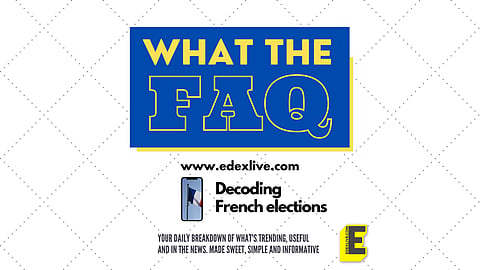

The results for the French presidential elections for 2022, which started on April 10, are in! Emmanuel Macron, the 44-year-old who has been serving as the President since 2017, has been re-elected as the President of the nation. He was the youngest President in French history the first time around, in 2017, when he defeated far-right leader Marine Le Pen with 66.1% of the vote in the second round.
This time, a sense of déjà vu prevailed when Macron secured 58.8 per cent of the votes compared to Marine Le Pen's 41.2 per cent share. The elections, however, came with a few asterisk marks, none more visible than the high abstention rate this time around.
What were the other subplots that garnered attention? We decode it all here in this round-up of #WhatTheFAQ.
First up, what is the two-round system of election that France follows?
In the first round, the voters choose between a dozen or more candidates. The two candidates receiving the most number of votes face each other in the second round runoff. Unless, a candidate gets an absolute majority of votes in the first round, in which case the candidate is elected President. This, however, has never been achieved since France first started direct voting in 1965.
What is the abstention rate and why was it so high?
Abstention is a term in election dynamics when a citizen either does not go to vote or is present during the vote but does not cast a ballot. In France, the main polling stations reported an abstention rate of 28 per cent which is the highest observed in the country since 1969. Political analysts point to the low turnout rates as a consequence of the uncertainty of public support. It also didn't help the matter that the elections coincided with school holidays this time.
What has caused the unrest among students over the elections?
Before the voting phase took place, hundreds of French students across universities demonstrated their anger over France's presidential election. The main grievance is with the limited choice between centrist Emmanuel Macron and far-right leader Marine Le Pen. The protesting students claimed that neither would do enough to protect the poor or the environment. The students were mostly supporters of the left-wing candidate Jean-Luc Melenchon, who lost out on a chance at the presidency after falling one per cent short of Le Pen in the first round of the presidential vote.
What was the reaction of people after Macron was reelected?
Hundreds of protesters emerged on the streets after the results were announced. Police forces sprayed teargas on them in central Paris. The reaction supported opinions that Macron's victory stemmed largely from the lack of support for Le Pen, who had campaigned and promised to dilute ties with the EU (European Union), NATO (North Atlantic Treaty Organization) and Germany. She was also perceived to be on overly-friendly terms with Russia as she spoke against the EU sanctions on Russian energy supplies.
What did Macron say post his victory?
The president thanked his supporters and acknowledged the fact that many voted for him to simply block the extreme right. He addressed that his second term would not be a continuation of the first as he would address the current problems facing the country. He pledged to reunite the country that is "filled with so many doubts, so many divisions."
